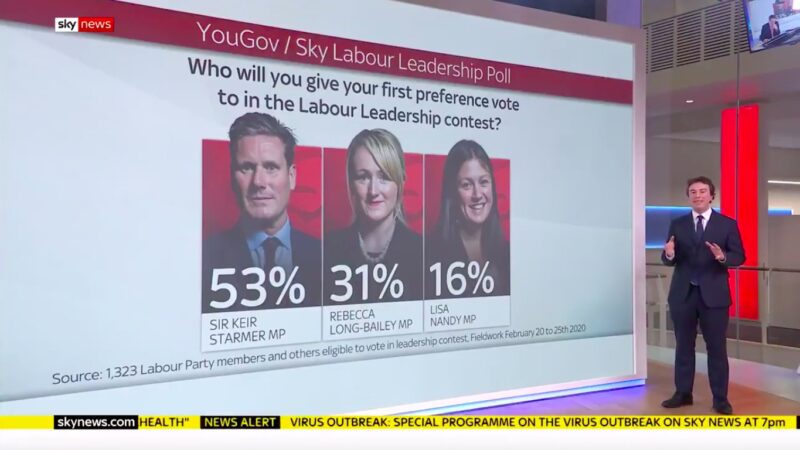
Keir Starmer is firmly in the lead – at least that was the headline from the latest YouGov poll released yesterday. The Camden MP recently told the HuffPost that a “big” victory in the leadership contest would be necessary to unite the Labour Party, and the analysis suggests that is exactly what he will be getting. The poll predicts a win for Starmer in the first round, securing 53% of first preferences – meanwhile rivals Rebecca Long-Bailey and Lisa Nandy polled at 31% and 16% respectively. Starmer does well on second preferences too – if Nandy were knocked out of the contest his lead would increase to 42 points over Long-Bailey at 66% to 24%. In terms of how this compares with other recent leadership contests, Jeremy Corbyn won in 2015 with 60% of the vote and in 2016 with 62%. While Starmer might have less of a lead, the fact that he can emerge victorious in the first round is significant.
Long-Bailey predictably performed well with members who joined the party between the 2015 and 2019 general elections, but still only holds a lead over Starmer in this category of 46% to 43%. This means that many of the members who have backed Corbyn in the past are now prepared to support Starmer. He is the clear favourite among those who joined before 2015, securing 56% of the vote to Long-Bailey’s 21%, and with those who have signed up since the last election at 67% to 11%. Interestingly, Starmer has an even larger lead among affiliated trade union members – 61% to 21%. Union members proved strongly supportive of Corbyn in both of the last leadership elections, with the outgoing Labour leader having received 58% and 60% of their votes in each race, and we might have expected them to favour Long-Bailey this time.
Nandy did well among young Labour members, getting 28% of the vote from those aged between 18 and 24 – compared with between 11% and 18% from older members. The most favourable age bracket for Long-Bailey was those between 25 and 49 and saw her take 35% of the vote. In contrast, Starmer did best among those aged over 65 – however the north London candidate still secured the backing of 49% of those under the age of 24 and performed best across all age groups. Both Starmer and Long-Bailey secured a fairly even gender balance, while Nandy had a slightly better response from male respondents, obtaining 18% of all votes from men compared to 13% from women.
In the deputy leadership contest the polling put Angela Rayner out in front with the Ashton-under-Lyne MP receiving 47% of first preferences. Richard Burgon placed a distant second on 19%, while Rosena Allin-Khan, Dawn Butler, and Ian Murray brought up the rear with 13%, 12% and 9% respectively. YouGov predicts a win for Rayner in the second round of counting with 52% of the vote. In contrast to a much more divided field in the leadership race, Rayner does well with members who joined the party at all times – enjoying the support of 50% of new sign ups since the last election, as well as 47% of members who joined between 2015 and 2019, and 46% of the pre-2015 intake. She also got 49% of affiliated members’ support, and the backing of 47% of regular party members.
50% of those surveyed said that Labour should keep broadly the same policies under the next leader, while 44% indicated that the party’s platform needs a change. This broke down pretty evenly among those members who joined the party before 2015, while 67% of those who joined between 2015 and 2019 supported retaining the policies and 69% of those who joined since last December want to see a change in direction. It’s interesting that Starmer seems to have managed to appeal to both those supportive of continuity and those who want to see a break with Corbynism. It shows that his careful unity messaging throughout the campaign has been effective, but could also suggest that should he win there will be some big bust-ups down the road.




More from LabourList
‘It’s one year since I became Britain’s youngest MP. Here’s what I’ve achieved so far’
Tribute: ‘David Lipsey’s joie de vivre is missing in Labour politics today’
Ellie Reeves: ‘One year in, the next phase begins – focused on living standards’